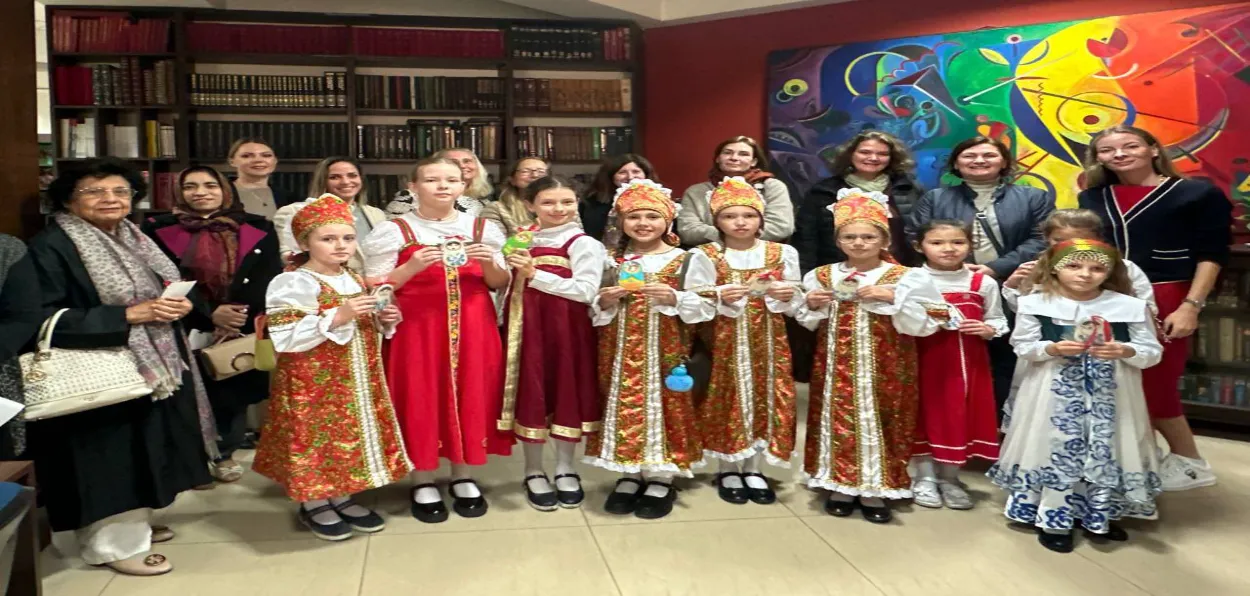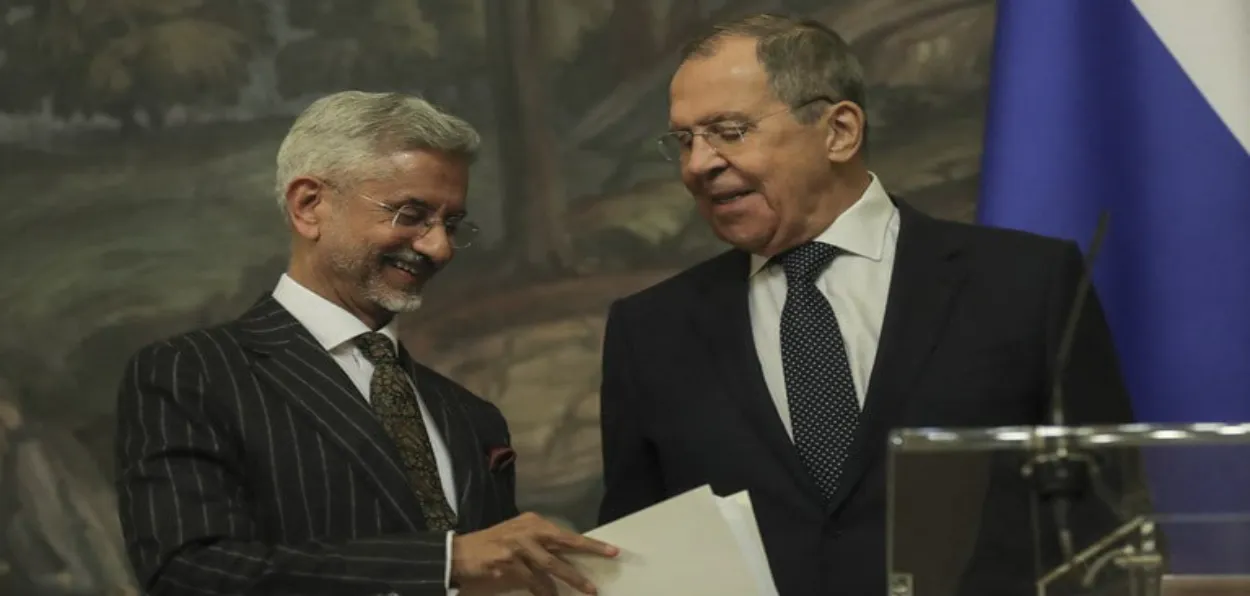
Aditi Bhaduri
The five-day visit of External Affairs Minister S. Jaishankar to the Russian Federation from 25-29 December 2023 has caused quite a stir both in India and Russia and abroad as many angry opinion pieces in Western media show. Why has this visit caused this stir; what was the visit meant to convey; Was it meant to reboot bilateral relations or is there an inevitability to Indo-Russiam ties? The answer must lie somewhere in between.
Five days is a significantly long time for a cabinet minister and coming just when the year was ending, coinciding with holidays in both countries, to spend in another country. It also happened in December, a historically symbolic month in bilateral relations. Fifty-two years ago on December 6, 1971, India became the first country to recognize the newly liberated Bangladesh. In this war of liberation along with India's generosity, valour, and decisiveness, the Soviet Union (USSR) – of which Russia is the inheritor State -had played a pivotal role. The astuteness of then Prime Minister Indira Gandhi to quickly conclude the 1971 Indo-Soviet Treaty of Peace, Friendship, and Cooperation in August 1971 had a direct impact on the decisive battle in the eastern war theatre between India and Pakistan.
A crucial clause that if either country was attacked, the other would consult to "remove such threat" and "take appropriate effective measures to ensure peace and the security of their countries" became a deterrent for Pakistan, its all-weather friend China. Soviet military support allowed India to take on a range of powers supporting Pakistan - the US, Jordan, Turkey, and Iran under its Shah Mohammed Reza Pahla.
Given this history, coupled with India's geopolitical location - organically linked to Eurasia - Jaishankar 's visit should not have come as a surprise. December is usually also when annual bilateral summits between the two sides take place. The last took place in Delhi in 2021 but since the outbreak of Russia’s 'special military operations ' in Ukraine no summit has taken place.
 External Affairs Minister Dr S Jaishankar with his Russian counterpart Sergei Lavrov
External Affairs Minister Dr S Jaishankar with his Russian counterpart Sergei Lavrov
The visit seems to have gone extremely well. The minister met his Russian counterpart Sergei Lavrov, with whom he discussed bilateral and international issues, including the Indo-pacific, the Ukraine Conflict, the situation in Gaza, Afghanistan and Central Asia and BRICS, SCO, G20, and the UN, and signed a Protocol on Consultations for the next 40 years. He met Russian Deputy Prime Minister Denis Manturov with whom discussed bilateral and economic cooperation, including, trade, finance, connectivity, energy, fertilizers, civil aviation, and nuclear domains.
Three documents relating to the Kudan Kulam Nuclear Power Plants, an MoU on cooperation in pharmaceuticals and healthcare, and a Protocol on Foreign Office Consultations were signed during the visit. In this context, it is worth mentioning that the Kudan Kulam Nuclear Power Plant is India’s only nuclear power plant established with another country.
There has also been a commitment to accelerate negotiations on a free trade agreement with the Russia-led Eurasian Economic Union, which also includes Armenia, Bellorussia, Kazakhstan, and Kyrgyzstan. Trade has been at an all-time high even with intermittent payment and pricing issues between India and Russia regarding oil which has emerged as the number one import commodity from Russia. Besides this, according to sources, India and Russia are also exploring joint weapons manufacturing under the "Make in India" and "Atmanirbhar Bharat" schemes, participating in connectivity projects like the Chennai-Vladivostok and the International North-South Transport Corridor (INSTC), as well as joint economic and other collaboration in third countries.
The visit has seen quite a churning in the international media, sparking a range of vituperative opinion and editorial pieces. The Russian media of course has hailed the visit with some gushing headlines like 'Modi Wants To See Putin, U.S. Fails To Steal India Away From Russia', which the Middle East Media Research Institute thought fit to translate into English on their site.
So why this brouhaha?
Since the Ukraine war, Russia has been under unprecedented sanctions from the West, while Ukraine has been armed to the teeth by the US and its NATO allies such that the conflict has reached a stalemate with neither side able to achieve a victory. Simultaneously pressure has been mounted on India to cut down on its engagement with Russia. Why should it come as a surprise that India has refused to do so?
Prime Minister Narendra Modi with Russian President Vladimir Putin (File)
India had earlier also resisted US pressure to cancel its agreement to purchase the S 400 TRIUMF missiles from Russia, even with the threat of CAATSA hanging over it. In the meanwhile, it was deepening its engagement with the US, but then India had longstanding defense relations with Russia, anchored in the Agreement on the Programme for Military-Technical Cooperation, the last one signed during Putin's visit to New Delhi in December 2021. It is not about to throw it away while cultivating ties with other countries.
This time around India has directly benefitted from Russia's offer of unprecedented discounted prices on oil purchases. Which country in its right senses, especially one as energy-hungry as India is, would refuse such an offer for one which it can even pay in local currency? According to some estimates, India became the world’s leading importer of Russian crude oil in 2023, with bilateral trade in 2023 alone reaching unprecedented levels of 50 billion USD. Moreover, the European Union, which adheres to sanctions against Russia, exports this oil from India. So, why blame India?
Interestingly, the India-Russia relationship as we see it today precedes this by at least a century.
This is documented in the writings of philosophers like Nikolai Roerich, the paintings of artists like Vasily Vereshagin, and the legacies of those like Elena Blavatskaya and Gerasim Lebedov, considered the father of Russian Indology. Indian engagement with Russia began a little later, anchored mostly in the anti-imperialistic and social-political thought of the Russian Revolution. Since India’s independence, bilateral engagement has found reflection in economic and defense cooperation based on strict respect for each other's sovereignty and territorial integrity. It is, for example, difficult to imagine Khalistani militants finding refuge in Russian territory.
Besides, India and Russia cooperate on several multilateral platforms- G20, BRICS, and the Shanghai Cooperation Organization, all of which are growing.
ALSO READ: India can't be more Arab than Arabs in supporting cause of Palestine
Indo-Russian relations, may, therefore, require rebooting from time to time but there also seems to be an inevitability to them. Instead of sulking, other countries seeking partnership with India can use this paradigm. With Jaishankar's visit to Moscow and St. Petersburg India has proven itself to be a time-tested reliable partner and an all-weather friend, with a long memory. This should be acknowledged by both Russia and others seeking a partnership with India.
Aditi Bhaduri is a journalist and political analyst specializing in West and Central Asia.
